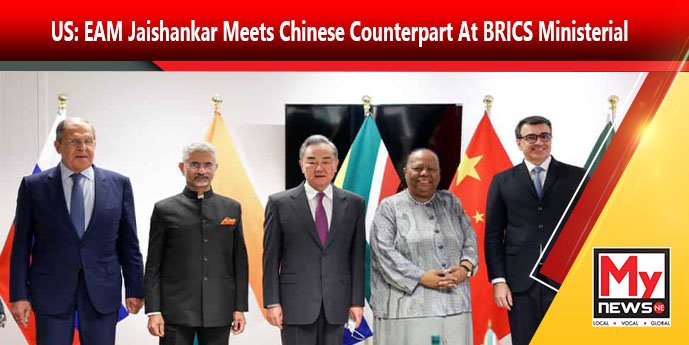US: EAM Jaishankar Meets Chinese Counterpart At BRICS Ministerial
Guwahati: External Affairs Minister S. Jaishankar met his Chinese counterpart Wang Yi after criticising China for obstructing the designation of terrorists with ties to Pakistan in the relevant United Nations (UN) sanctions committee at a BRICS (Brazil, Russia, India, China, and South Africa) ministerial meeting in New York.
The two leaders met in person at a BRICS foreign ministers meeting that South Africa sponsored. Sergei Lavrov, the foreign minister of Russia, was also present at the meeting. In the BRICS meeting, the ministers discussed intra-BRICS initiatives as well as significant global and regional concerns on the United Nations (UN) agenda in the political, security, economic, financial, and sustainable development domains.
The possibility of mutual support for their efforts at the 77th session of the UN General Assembly was also discussed by the ministers (UNGA). They emphasised support for the BRICS nations’ sustained collaboration in areas of shared interest, such as through frequent communication between their Permanent Missions to the UN.
Since its founding, the BRICS group, to which South Africa was included in 2011, has advocated for greater representation of the world’s main developing economies and has spoken out against what it sees as an excessive dominance of the Western powers. While tensions between India and China, which in 2020 erupted into a violent border battle, remain unsolved, they are the long-standing source of internal conflict within the BRICS. Because China broke two decades’ worth of agreements with India, some claim the value of the BRICS may be diminished. Not in New York, but in the Galwan Valley, BRICS was placed on life support.
Tanvi Madan, a senior scholar in the Brookings Institution’s programme on foreign policy, said: “India’s worries about Chinese actions in South Asia, the Indo-Pacific, and in international organisations like the UNSC have contributed to the cold between India and China, in addition to the 2020 crisis. That would inevitably have an impact on associations like BRICS, in which both parties take part.”
But there is still mystery around the bilateral meeting between China and India that will take place in conjunction with the UN General Assembly (UNGA).
On the fringes of the UNGA, Jaishankar has scheduled more than 50 meetings; however, no bilateral discussions with China have been scheduled. In addition, the Chinese Foreign Minister is in New York for the UN General Assembly.
Jaishankar made a subtle jab at China earlier in the day for delaying the designation of Lashkar-e-Taiba (LeT) terrorist Sajid Mir as a “global terrorist.”
He is the most sought terrorist in India and took part in the Mumbai attacks in 2008.
When it comes to sanctioning some of the most feared terrorists in the world, Jaishankar claimed that some nations have helped to allow impunity.
Politics should never ever serve as a shield to avoid accountability, the minister said during a UNSC briefing on Ukraine’s “Fight against Impunity.”
“Nor indeed to facilitate impunity. Regrettably, we have seen this of late in this very chamber, when it comes to sanctioning some of the world’s most dreaded terrorists.”
“If egregious attacks committed in broad daylight are left unpunished, this Council must reflect on the signals we are sending on impunity. There must be consistency if we are to ensure credibility,” he added.
After the conflict in the Galwan Valley, relations between China and India deteriorated. According to government sources, the disengagement procedure in the Gogra Heights-Hot Springs region close to Patrolling Point-15 in the eastern Ladakh sector was recently completed on September 13.
The two sides have also finished checking each other’s locations and relocating troops from the point of conflict.
Since April to May 2020, there has been a standoff between China and India because of Chinese Army violations in the Finger region, Galwan Valley, Hot Springs, and Kongrung Nala, among other places. After intense battles with Chinese troops in the Galwan Valley in June 2020, the situation deteriorated.

